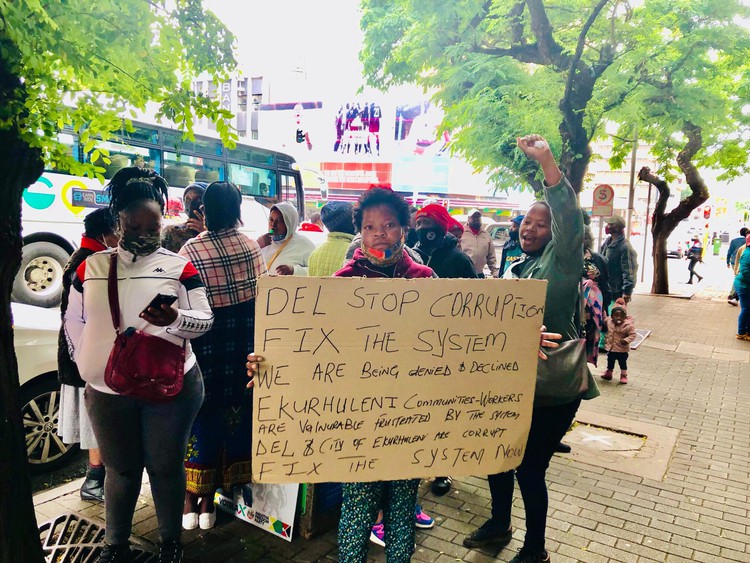
22 June 2023
A protest organised by the Simunye Workers Forum in 2021. The Labour Court has ruled that the forum can register as a trade union. Archive photo: Kimberly Mutandiro
The Simunye Workers Forum (SWF) has won a major legal victory, with the Johannesburg Labour Court ruling that it can register as a union.
The SWF has about 6,600 members, mainly casual workers, and the ruling by Judge Andre Van Niekerk means it can now formally represent its members in disputes, in wage negotiations and in matters before the Commission for Conciliation, Mediation and Arbitration (CCMA).
The forum went to court after the Registrar of Labour Relations refused to register it as a union.
It was formed in 2015. Initially, the forum said, it did not apply for registration as a union, the forum said, because of mistrust of a union movement which members considered had failed them.
But at the end of 2020, the forum decided to apply for registration in terms of the Labour Relations Act (LRA).
To that end, the forum adopted a constitution, opened a bank account and held an annual general meeting. In June 2022, its application to the Registrar was refused.
Judge van Niekerk said the forum, in its application, described itself as a “modern” union, formed by workers in non-standard employment relationships.
It had its roots in the Casual Workers Advice Office (CWAO), a non-profit registered independent community advice office.
The judge said the forum’s constitution records that it has deliberately constituted itself to be different from the organisational model developed by the traditional South African trade union movement. It aims to keep decision-making power in the hands of members affected by the decision and to ensure that all work done by members is without remuneration, so as to remove any potential for personal financial interest.
Membership fees are fixed at R12.50 a month or R150 annually.
Ordinary meetings are convened when necessary. Each meeting elects, for the next meeting, a chairperson and a secretary. Decisions are taken by majority vote.
Judge van Niekerk said the Registrar had refused to register the forum because, it was claimed, its constitution did not meet the requirements of the LRA and the registrar did not consider it to be a “genuine trade union” independent of the CWAO.
But, Judge van Niekerk said, nowhere in the LRA were trade unions barred from obtaining services from community advice offices or working in collaboration with them.
The Registrar’s decision in this respect was “simply wrong”, the judge said.
He said he failed to see how SWF’s constitution failed to meet the requirements of the Act.
“To require that the constitution specifically establish the offices of office bearer officials and trade union representatives would present an unjustifiable inroad into SWF’s autonomy.
“The constitution addresses the fact that its organisational structure does not provide for office bearers.”
The judge said there could be no doubt that SWF was an association of employees whose principal purpose was to regulate relationships between members and their employers.
While the structure was unique, that was not, in itself, a basis to reject the application, he said.
“The emergence of trade unions that eschew traditional structures is inevitable. Since the LRA was brought into operation in 1995, the labour market has changed radically.
“Workforces, once homogenous, have fragmented and segmented into core and marginal groups where new, less secure forms of work have emerged.
“New forms of worker organisations will inevitably emerge to meet these challenges and better serve the interests of the more vulnerable.”
Judge van Niekerk said: “The Registrar is not the gatekeeper for traditional forms of trade union organisations, nor is it his function to question the wisdom of the SWF’s choices.”
The judge said the SWF had a “unique name” , a compliant constitution and an address in South Africa. It was also independent of any employer or employer organisation.
“There is nothing untoward in its relationship with the CWAO.
“It is a genuine trade union. It is not a vehicle for enriching individuals,” he said.
Judge van Niekerk ordered the Registrar to register the forum as a trade union within 14 days and ordered the Registrar to pay some of the costs.
A spokesperson for the SWF said similar worker forums exist all over the country - mainly for casual and farm workers - and the ruling now gave the green light for them to register as trade unions too.
“Registration will put a decisive end to bosses and CCMA Commissioners constantly refusing to allow SWF activists to represent its members in disputes and wage negotiations.”